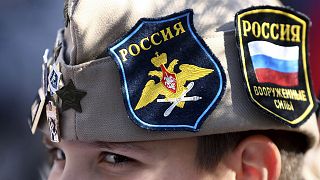Bosnian Serb branch of Russian 'Night Wolves' biker group stage pro-Putin protests
By Aleksandar Brezar with AP • Updated: 13/03/2022 - 11:28

A boy wears Russian insignia on his hat as he rallies in Banjaluka, Bosnia, Saturday, 12 March 2022 - Copyright AP Photo/Armin Durgut
About one hundred Bosnian Serb nationalists demonstrated Saturday in the country's second-largest city Banjaluka in support of Russian President Vladimir Putin's invasion of Ukraine.
Participants waved Russian flags and described Russia's decision to invade its much smaller neighbour as a legitimate "battle to liberate [Ukraine's] subjugated people".
"Russia is not at war with Ukraine, it is at war with the dark Euro-Atlantic forces that want to dominate the world and destroy it," said Zdravko Močević, one of over 100 people -- mostly men -- who joined the rally.
The pro-Russia protests are one of the few in Europe since Moscow invaded Ukraine on 24 February.
The largest demonstrations in support of the Kremlin saw thousands take to the streets of Serbia's capital Belgrade on 4 March, carrying placards with the letter Z -- now synonymous with the invasion -- and Russian and Serb nationalist flags.
Dozens of Serb nationalists hold pro-Russia rally in Montenegro
The gathering in Banjaluka was organised by Bosnian Serb members of the Night Wolves, a local branch of the Russian motorcycle club that staunchly supports President Vladimir Putin.
Putin has repeatedly referred to the group as "friends", and has appeared at their rallies, riding a Harley-Davidson motorcycle. The Night Wolves took part in the 2014 occupation of Crimea and the fighting in Donbas.
Speakers at the Banjaluka event included representatives of several local organisations, including the Serb-Russian Bridge and Serb People's Movement "It's Our Choice".
Bosnian Serb secessionist leader Milorad Dodik who was recently slapped with US sanctions for alleged corruption is widely understood to be the Kremlin's favourite in the region.
Dodik has also maintained close ties with the local branch of the Night Wolves.
Political power in multiethnic Bosnia and Herzegovina is shared between Bosniak, Croat and Serb ethnic communities, enabling the country’s three main ethnic groups to dominate domestic politics.
This arrangement came out of the 1995 Dayton Peace Accords, effectively ending the 1992-1995 war between the three sides that killed over 100,000 people and displaced millions.

A sticker with a letter Z is seen on a car during a rally in support of Russia in Belgrade, Serbia, Sunday, March 13, 2022. Despite formally seeking EU membership, Serbia has refused to introduce international sanctions against its ally Russia. EU officials have repeatedly warned Serbia that it will have to align itself with the bloc's foreign policies if it wants to join.
Dodik, whose SNSD party is struggling to retain popularity in the run-up to the general elections in the autumn, currently serves as the Serb member of the country's tripartite presidency.
Bosnia’s biggest political crisis for 26 years fuels anguish and discontent
Despite Dodik's vocal opposition, Bosnia joined a historic vote earlier this month in the UN General Assembly denouncing Russia for invading Ukraine.
At the same time on Saturday, at least 5,000 Bosnians gathered in the northeastern city of Tuzla at a peace rally, expressing their support for Ukraine and demanding the end of the war.
No comments:
Post a Comment